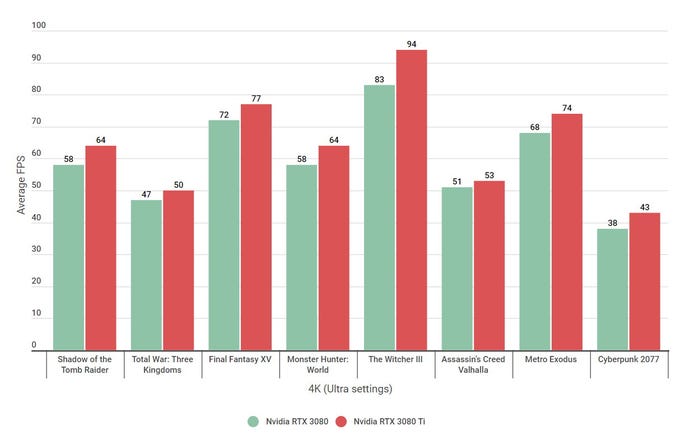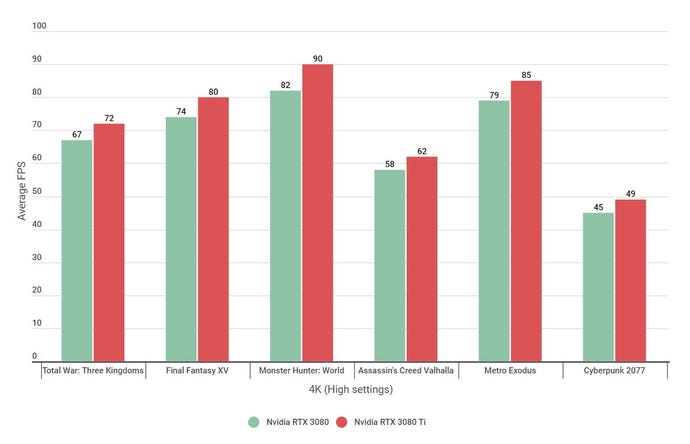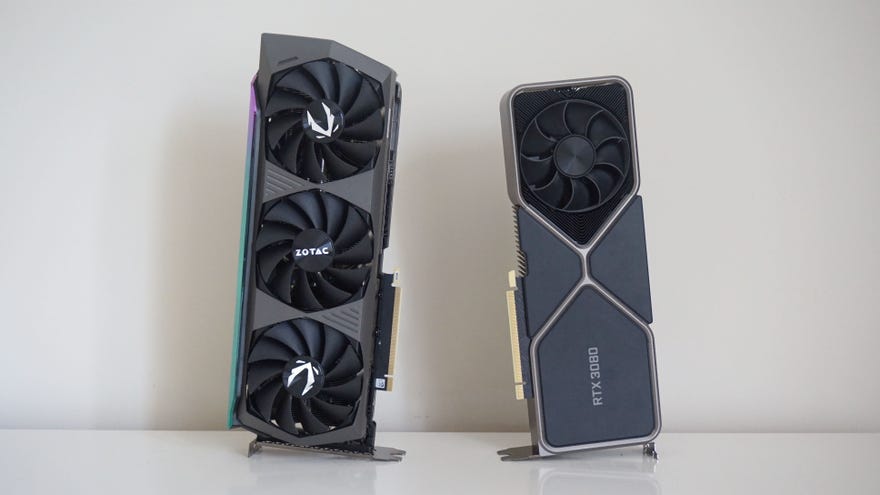Nvidia RTX 3080 vs 3080 Ti: how much faster is Nvidia's new flagship GPU?
What are you really getting with the RTX 3080 Ti?
With the launch of Nvidia's GeForce RTX 3080 Ti this month, the vanilla version of the RTX 3080 is no longer Nvidia's flagship gaming GPU. Traditionally, Nvidia's Ti models have offered substantially more performance than their non-Ti siblings, as we saw last generation with the RTX 2080 and 2080 Ti, and the generation before that with the GTX 1080 and 1080 Ti. But can the same be said of Nvidia's RTX 30 series? Is the RTX 3080 Ti really the best graphics card for 4K gaming, or does the vanilla RTX 3080 still manage to hold its own against its more expensive Ti sibling? Let's find out via the medium of some lovely graphs.
To test the RTX 3080 and RTX 3080 Ti, I used Nvidia's RTX 3080 Founders Edition and the Zotac GeForce RTX 3080 Ti AMP Holo edition that I used in my RTX 3080 Ti review. I ran both cards at their default clock speeds, and I've kept ray tracing and DLSS switched off for this particular comparison test as well.
As for the rest of my PC specs, I paired both cards with my usual Intel Core i5-10600K processor and 16GB of Corsair Vengeance Pro RGB RAM and put them head to head in my suite of graphics benchmarks, taking an average frame rate from their own built-in benchmarking tools or from my own repeatable manual gameplay tests. These games include a mix of blockbusters from the last couple of years: Shadow Of The Tomb Raider, Total War: Three Kingdoms, Final Fantasy XV, Monster Hunter: World, Assassin's Creed Valhalla, The Witcher 3, Metro Exodus and Cyberpunk 2077.
Since these are Nvidia's flagship RTX gaming GPUs, I've focused primarily on how they perform playing games at 4K in this article, but I've also included some 1440p results with some added RTX 3070 figures so you can see exactly how much extra performance you're getting over Nvidia's second-tier of GPUs. I haven't included any 1080p results here because, let's be honest, you shouldn't be buying either of these cards for 1080p gaming. There are plenty of other, usually much cheaper graphics cards out there, such as the RTX 3060, that offer more than enough performance at 1080p, and I'd also recommend sticking with an RTX 3070 or AMD's Radeon RX 6700 XT for playing games at 1440p, too, as anything more is just plain old overkill. With all that in mind, then, let's take a look at some lovely bar charts.
RTX 3080 vs 3080 Ti: 4K benchmarks
Starting with how the RTX 3080 and RTX 3080 Ti perform at 4K on Ultra / Max settings in today's biggest blockbusters, we can see that, in most cases, the RTX 3080 Ti is only a fraction ahead of its vanilla sibling. Older games, such as The Witcher III, give the RTX 3080 Ti an avearge lead of around 10fps, but in newer titles is much smaller, often only reaching around 5-6fps in my benchmark results or, in the case of Assassin's Creed Valhalla, a lead of just 2fps.

It's the kind of difference you'd be unlikely to actually spot in your moment-to-moment gameplay, and you'd also only 'see' that 10fps in The Witcher III if you had a 4K monitor with a high refresh rate, too. Most of today's best 4K gaming monitors do have high refresh rates, admittedly, but more affordable screens are usually capped at a regular 60Hz. If you've got one of these 60Hz screens, you're really not getting much benefit from the RTX 3080 Ti at all, as both cards will feel completely identical for anything at 60fps or above.
This is especially true once you drop the settings down to High, where both the RTX 3080 and 3080 Ti can hit at least 60fps on nearly every game going - with the exception of Cyberpunk 2077. I haven't included Shadow Of The Tomb Raider or The Witcher III in this graph, as both cards were already capable of hitting well over 60fps in the latter, and were pretty much there in the former, too (and can certainly get well over the 60fps mark once you knock Tomb Raider's anti-aliasing settings down a peg).

Once again, though, the RTX 3080 Ti isn't that far ahead of the normal RTX 3080. At best you're looking at a lead of around 8fps, but at worst you're only going to get around half of that - as we can see in Cyberpunk 2077. Of course, throw DLSS into the mix with Cyberpunk and you're looking at well over 60fps on max settings in both instances, although my benchmark results actually had the regular RTX 3080 ahead of the Ti in my manual gameplay test. Only by a couple of frames, mind, but it just goes to show that with a relatively modest PC like mine, the RTX 3080 Ti isn't always going to produce the fastest results.
In short, I believe the vanilla RTX 3080 has more than enough oomph for playing games at 4K at the moment, as you're just not getting that much extra by opting for the Ti.
RTX 3080 vs 3080 Ti: 1440p benchmarks
As I said earlier, the RTX 3080 and RTX 3080 Ti aren't really intended for playing games at 2560x1440 - they're much too powerful for that - but I thought it would be interesting nonetheless to see how they stack up to Nvidia's next GPU down, the RTX 3070 (which is their big 1440p GPU).

On Ultra / Max settings, the RTX 3080 and RTX 3080 Ti are clearly more than capable of hitting 60fps at this resolution, often hitting averages between 90-100fps. Even some of today's toughest games, such as Assassin's Creed Valhalla and Cyberpunk 2077, are well into the 70s on these two cards - although as you can see, the difference between the RTX 3080 and RTX 3080 Ti is a lot smaller than you might expect, sometimes ranging between as little as 4-6fps. Similarly, in the case of Cyberpunk 2077, it was the RTX 3080 that was once again the faster card, not the RTX 3080 Ti.
However, the difference you're getting versus the RTX 3070 is much starker, in many cases boosting performance by around 20fps. As always, there are some games that are much closer, such as Final Fantasy XV and Assassin's Creed Valhalla, but on the whole you're getting substantially more performance at this resolution with one of the RTX 3080 cards. That might make the RTX 3080 more tempting for those with high refresh rate 1440p gaming monitors (of which there are now an increasing number of floating around these days), but if you're not so fussed about playing games on max settings, then the RTX 3070 will do you just fine.
RTX 3080 vs 3080 Ti: which is best?
As I concluded in my RTX 3080 Ti review, Nvidia's new flagship GPU may technically offer the fastest speeds this side of their Titan-class RTX 3090, but you're really not missing out on much by opting for the regular version, either at 4K or 1440p. As such, the RTX 3080 remains my top recommendation for those after the best 4K graphics card.
Of course, due to the ongoing graphics card shortage at the moment, neither GPU is actually available to buy right now, and any RTX 3080s that do get put on sale often go for much more than their recommended starting price of £649 / $699. Indeed, you'll likely find many are just as expensive as the RTX 3080 Ti's starting price of £1049 / $1199, which is frankly just crazy money if you ask me. As such, I'd strongly recommend not buying a new GPU if you can help it just now, as you'll likely end up paying massively through the roof for it. Alas, the graphics card shortage isn't likely to resolve itself until next year, so sometimes needs must. I'd still recommend opting for the RTX 3080 if you can find it, but when both cards are roughly of a similar price right now, you may decide it's worth getting the Ti instead.
In an ideal world, though, the RTX 3080 would be hands down the better choice for 4K gaming, as I just don't believe the Ti's performance justifies its higher price.
For more next-gen graphics card comparisons, check out:


